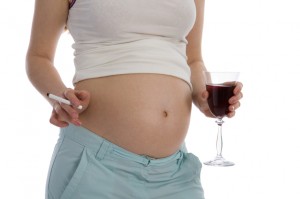Everyone knows that pregnancy and alcohol do not mix. Alcohol can cause premature birth, developmental problems, miscarriage, or still birth. Most doctors recommend that you completely abstain from alcohol while pregnant-better safe than sorry.
The true reason that pregnancy and alcohol do not mix is that if you drink alcohol while the fetus is going through certain developmental stages, the alcohol can interfere with the process, causing anything from birth defects to fetal death. There is also no way to know when these developmental processes are occurring. So a drink on a certain day during the pregnancy may have no negative effect, while the same amount of alcohol the next day could be devastating. There is no way to tell, and there is no amount of alcohol that has been proven to be safe.
Pregnancy and alcohol do not mix because drinking alcohol could cause Fetal Alcohol Syndrome. Fetal Alcohol Syndrome is a group of growth, mental, and physical problems that occur when a mother drinks alcohol while pregnant. Alcohol crosses the placental barrier, so that means when you drink, your baby drinks too. It can stunt fetal growth or weight, create distinctive facial defects, damage neurons and brain structures, and cause other physical damage.
Because your baby’s body is not equipped to digest alcohol, when alcohol enters the fetal blood stream, it can have a severe effect on the central nervous system. Developing brain structures are either malformed or development is interrupted by the presence of alcohol. This CNS damage is permanent, and is one of the biggest reasons that pregnancy and alcohol do not mix. Fetal alcohol syndrome is the number one cause of mental retardation in the developed world. Almost none of the babies who have fetal alcohol syndrome have normal brain development. With medical interventions, babies born with neurological defects due to fetal alcohol syndrome can show some improvement.
Fetal Alcohol Syndrome also causes distinct facial defects. The presence of these facial defects indicates brain damage, although brain damage can exist even if the facial features are normal. Fetal alcohol syndrome causes narrow eyes, a thin upper lip, and a flattened groove between the nose and upper lip. All of the defects are only present in cases of severe fetal alcohol syndrome.
Experts are agreed that alcohol and pregnancy do not mix, but the amount of alcohol, the frequency of drinking, and the timing have variable effects on the pregnancy. Many women panic when they find out they are pregnant, and they have been drinking in the first few weeks. The best plan of action is to stop drinking immediately when you find out you are pregnant, and not to drink at all if you are trying to get pregnant. Drinking in the very early stages of pregnancy is usually less risky than drinking later on, so if you had a few drinks in the beginning, you are probably ok. Just be sure to stop as soon as you find out.


